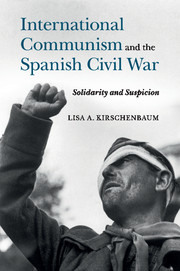Crossref Citations
This Book has been
cited by the following publications. This list is generated based on data provided by Crossref.
Rodrìguez Jiménez, Francisco Javier
2016.
Trade Unionism and Spain-Us Political Relations, 1945-1953.
VENTUNESIMO SECOLO,
p.
96.
GARCÍA, HUGO
2016.
Transnational History: A New Paradigm for Anti-Fascist Studies?.
Contemporary European History,
Vol. 25,
Issue. 4,
p.
563.
2016.
La guerre d'Espagne.
p.
329.
Caballero Vázquez, Miguel
2016.
Cibeles en el Palacio de los Soviets. Debates sobre monumentalidad en la Guerra Civil Española.
Journal of Spanish Cultural Studies,
Vol. 17,
Issue. 4,
p.
323.
Molden, Berthold
2017.
Las muchas familias de un joven cosmopolita. Instantáneas de Friedrich Katz en París, Nueva York y México (1938‑1949).
L’Ordinaire des Amériques,
Rodríguez-Jiménez, Francisco
2018.
«Palos en la rueda…» Acción exterior del sindicalismo estadounidense en España, 1945-1975.
Hispania,
Vol. 78,
Issue. 259,
p.
377.
Rueda Laffond, José Carlos
2018.
Autorretratos en rojo: explorando la autobiografía comunista.
Journal of Spanish Cultural Studies,
Vol. 19,
Issue. 4,
p.
407.
Kowalsky, Daniel
2019.
Soviet Foreign Policy from the Spanish Civil War to the Molotov-Ribbentrop Pact, 1936–1939.
Dictatorships & Democracies,
p.
69.
Anton‐Solanas, Isabel
Wakefield, Ann
and
Hallett, Christine E.
2019.
International nurses to the rescue: The role and contribution of the nurses of the International Brigades during the Spanish Civil War.
Japan Journal of Nursing Science,
Vol. 16,
Issue. 2,
p.
103.
Drachewych, Oleksa
2019.
The Communist Transnational? Transnational studies and the history of the Comintern.
History Compass,
Vol. 17,
Issue. 2,
Kruizinga, Samuël
2020.
Fear and Loathing in Spain. Dutch Foreign Fighters in the Spanish Civil War.
European Review of History: Revue européenne d'histoire,
Vol. 27,
Issue. 1-2,
p.
134.
Arielli, Nir
2020.
Foreign fighters and war volunteers: between myth and reality.
European Review of History: Revue européenne d'histoire,
Vol. 27,
Issue. 1-2,
p.
54.
Lunev, S. M.
2021.
The Image of Great Britain in the Soviet Press in the Context of the Spanish Civil War (1936‒1939).
Moscow University Bulletin of World Politics,
Vol. 13,
Issue. 1,
p.
196.
Contreras Zubillaga, Igor
and
Moreda Rodríguez, Eva
2021.
‘Spain in our Ears: International Musical Responses in Support of the Republic during the Spanish Civil War’.
Journal of War & Culture Studies,
Vol. 14,
Issue. 4,
p.
365.
Gaspar Celaya, Diego
2021.
Spanish exiles, transnational soldiers from the French internment camps to the Free French Forces.
Journal of Iberian and Latin American Studies,
Vol. 27,
Issue. 1,
p.
27.
Latham, Robert
2022.
Organizing Anticapitalist Internationalism in Contemporary and Historical Perspective.
Rethinking Marxism,
Vol. 34,
Issue. 4,
p.
449.
Kruizinga, Samuël
and
van der Veen, Miriam
2022.
Sketches of Spain: The Role of the Left-Wing Press in Britain, the Netherlands, and amongst Exiled Germans in Recruiting Volunteers for Republican Spain during the Spanish Civil War, 1936–1939.
Contemporary European History,
p.
1.
Wood, Tony
2022.
Another Country: Cuban Communism and Black Self-Determination, 1932–1936.
Hispanic American Historical Review,
Vol. 102,
Issue. 4,
p.
643.
Casey, Maurice J.
2023.
‘Save Me from My Friends’: The Transnational Intimacies of an Irish-Latvian Couple within and beyond the Irish Revolution, 1916–1921.
Contemporary European History,
Vol. 32,
Issue. 4,
p.
551.
Sayim, Burak
2023.
Of Transits and Transitions: Moscow-Bound Travels of Foreign Communists as a Transformative Experience, 1919–1939.
Revolutionary Russia,
Vol. 36,
Issue. 1,
p.
100.





